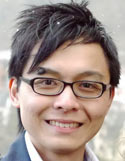Irwin Chan, Sessional
Education
BA (Hons) (HKU), MA (UCL), PhD (UBC)
About
Office Hours 2024W term 1
- In person and on Zoom
- By appointment only (email irwin.chan@ubc.ca)
About Me
I teach Ethics and Critical Thinking and I do research on teaching. Doing research on teaching helps me improve my own teaching and promote pedagogical innovations to other philosophy instructors. I am particularly interested in topics related to the effective use of formative assessment. I think that the value of assessment lies not primarily in its summative functions (i.e. to assign students with a grade) but in its formative functions (i.e. to provide students with feedback which helps them improve learning). Assignments should therefore be designed in ways that make the most of their formative functions.
My current project is Mastery Learning. The theory of mastery learning was originally proposed by Benjamin Bloom (1968) and Fred Keller (1968) and has recently been reinvigorated by Linda Nilson (2015). The underlying principle is to make use of various methods of instructions and allow multiple assignment submissions in order to enable students to achieve course learning objectives to a high level. Numerous studies show that mastery learning can significantly improve performance, learning, and student motivations. I have recently started conducting experiments on mastery learning and am writing a paper on how to effectively and efficiently utilize it.
My previous project is group/two-stage exams (Group/two-stage exams: students first do an exam individually, and then re-do the same exam in small groups. Students will get bonus points if they do better at the second stage.) I have conducted several group exams to ascertain that group exams (in philosophy) can improve exam performance and reduce students’ stress. I am also interested to think about the value of group exams (is it all about helping students get better grades?) and their fairness concern (e.g. free-riding). I have recently published a paper (Teaching Philosophy) and have led a few workshops/sessions on this topic.
During my PhD at UBC, I successfully finished a certificate program in higher education teaching and was certified CIRTL Scholar (CIRTL: Center for Integration of Research, Teaching, and Learning).
Teaching
Research
Research Interests (Scholarship of Teaching and Learning)
Formative Assessment, Mastery Learning, Group Exams, Collaborative Learning
Publications
Publication
“Should Talking Be Allowed during Exams?: Fairness and Value of Group Exams.” Teaching Philosophy 44 (4): 487–512.
Teaching-related Presentations and Workshop Facilitation
“Using Mastery Learning to Teach Critical Thinking.” 2022 APA Pacific Division Meeting.
“Talking is Encouraged During Exams: The Formative Use of Summative Exams.” 2021 Forum for Scholarship of Teaching and Learning, Mokakiiks Centre for Scholarship of Teaching and Learning, Mount Royal University.
“Collaborative Learning: Incubating Philosophical Argument, Writing, and Conversation.” Teaching Assistant Training Workshop. Department of Philosophy, University of British Columbia. (Nov 2021)
“Talking is Encouraged During Exams: How to Effectively Use Group Exams in Teaching Philosophy.” 2021 International Workshop-Conference on Teaching Philosophy, The American Association of Philosophy Teachers.
“Effectiveness of Group Exams in Teaching and Learning”. Graduate Students in Teaching Mini Conference 2018. The University of British Columbia. Vancouver, British Columbia.
